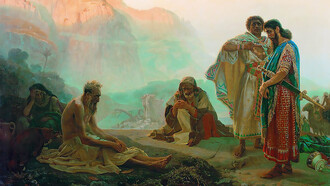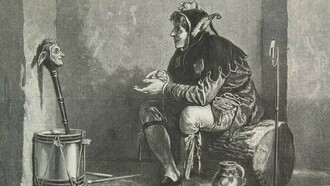The more we read about Hercules' labors, the more exposed we are to his bravery and victories. Therefore hope is felt in times of darkness. Just like Hercules, people today are dealing with their own challenges and we also can have a Hercules mindset. The Hercules myths show us to keep trying, and have faith, as he portrays the courage we can all have because we are heroes.
Hercules, a super-strong hero as portrayed in stories, had a rough time due to a vindictive stepmother who acted cruelly and enforced heroic tasks on him. Hera, really angry at Heracles, who was an illegitimate child of her husband Zeus, wanted to harm him and played a cruel trick on him. She made him believe his family were monsters.
Poor Heracles, thinking he was defending himself, ended up killing his loved ones. It's a sad tale showing how the gods' anger and tricks can lead to detriment, leaving Heracles to face the heartbreaking consequences of losing his whole family. But Hercules didn't give up. He did not allow Hera, his stepmother, to defeat him. He instead took on the challenge of the twelve super-courageous atonements as penance for his crime that Hera doubted he could complete.
Despite Hercules immense strength, he battled with a colossal ego, and the hero's first labor involved taming this ego, illustrating how important it is to have humility in the face of adversity. Hercules's battle with the Nemean Lion in his first task represents his struggle to control his wild and unruly self. The lion, which can't be defeated with regular weapons, is like the tough parts of Hercules' own nature. By beating the lion with his bare hands, Hercules shows us how we all need to work on mastering our own egos by ourselves, an important part of personal growth in our everyday lives.
In the context of Hercules and the Nemean Lion, one can draw parallels to the theme of overcoming one's inner demons or facing challenges that seem insurmountable. The lion could be seen as a symbol of the ego, in other words, representing aspects of Hercules' own pride, strength, and wild nature that needed to be tamed and controlled.
Studying Hercules' first task teaches us three important lessons:
- Staying alert: in Hercules' first job, he had to catch the Nemean Lion, a creature with super tough skin. Hercules needed to pay attention and be smart to figure out how to beat the lion. He ended up using his skills to choke the lion.
- Keeping dignity in tough times: facing the Nemean Lion was really hard, but Hercules didn't give in to fear or frustration. Instead, he kept his dignity by facing the challenge with determination and skill. This shows us how to handle tough situations with grace and see challenges as chances to get stronger.
- Growing through challenges: even when things are tough or change happens, Hercules' story tells us about human struggles and how we can change for the better. Taking on the Nemean Lion was a big challenge, but Hercules saw it as a chance to grow. Beating the lion wasn't just about being strong; it also needed a smart strategy. This teaches us that challenges can make us better if we face them with the right attitude.
This experience marked the beginning of Hercules' journey towards becoming a legendary hero, showcasing his willingness to confront challenges head-on. The tale of Hercules, with its mix of gods and personal struggles, still has wisdom for us today.
Think of it like this: Imagine someone facing a tough situation at work where they unintentionally make a huge mistake that affects their team. Instead of giving in to despair, they choose to take responsibility for their actions.
This is like Hercules acknowledging his mistakes and choosing exile for atonement. Then, seeking guidance. He decides to learn new skills and work hard to make amends, just like Hercules served as a slave for ten years to expiate his sins. The idea of overcoming the Nemean Lion is like conquering the challenges they face at work, learning to control their ego, and becoming a better team player.
The lessons of Hercules—staying strong, keeping dignity during tough times, and seeing challenges as opportunities for positive change shows how he became a guide and journeyed to growth and transformation.
The story of Heracles and his labors, including the encounter with the Nemean Lion, for me can also be rooted in Greek mythology and predates the advent of Christianity.
Here are a few potential symbolic connections that some people have suggested:
- Struggle and triumph over evil: the slaying of the Nemean Lion by Heracles is seen as a triumph over a powerful and evil force. Some individuals draw a parallel between this victory and the Christian concept of Christ overcoming the forces of sin and evil.
- Redemption and sacrifice: Heracles faced a series of challenging labors as a form of atonement for his past misdeeds. Similarly, some draw parallels with the idea of Christ's sacrifice on the cross for the redemption of humanity.
- Victory over death: the Nemean Lion was known for its impenetrable golden fur. Heracles, in overcoming this seemingly invincible foe, may be metaphorically connected to Christ's victory over death and resurrection.
The connections between Heracles and Christian themes are not explicit or direct but are rather attempts by some to find common motifs or universal themes across different cultural and religious traditions.
In short, Hercules's journey, particularly in slaying the Nemean Lion, imparts lessons applicable to our own lives. His identification of vulnerabilities, such as the struggle with ego, serves as a mirror for us to recognize our own shortcomings.
The hero's ability to maintain dignity and perseverance during trials, guides us through our toughest moments with grace. Most significantly, Hercules transforms seemingly insurmountable challenges into opportunities for growth and positive change. As we face our modern-day Nemean Lions, let us draw inspiration from Hercules, embracing setbacks not as defeats but as stepping stones towards personal triumph and enduring strength.















